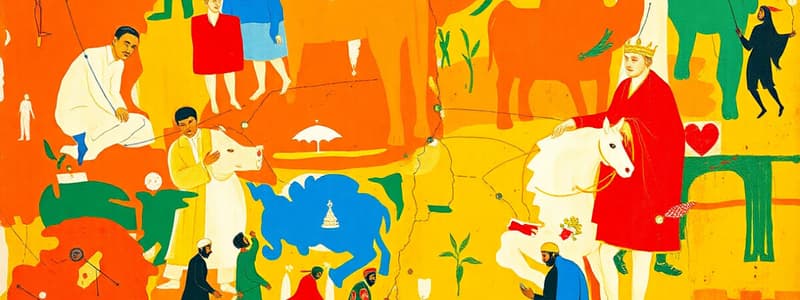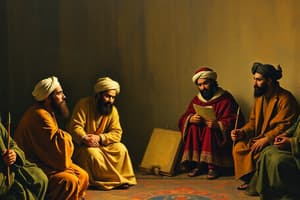Podcast
Questions and Answers
Muhammad began to attract followers from various social standings, primarily including the wealthy elite.
Muhammad began to attract followers from various social standings, primarily including the wealthy elite.
False (B)
The hijra refers to Muhammad's migration from Medina to Mecca.
The hijra refers to Muhammad's migration from Medina to Mecca.
False (B)
Islam spread rapidly and within 100 years occupied more territory than the Roman Empire.
Islam spread rapidly and within 100 years occupied more territory than the Roman Empire.
True (A)
Muslims do not believe in the divine destiny, also known as predestination.
Muslims do not believe in the divine destiny, also known as predestination.
Muslims believe in the existence of angels, with four being particularly esteemed and mentioned in the Qur’an.
Muslims believe in the existence of angels, with four being particularly esteemed and mentioned in the Qur’an.
Study Notes
Muhammad's Early Life and Followers
- Muhammad attracted a group of followers primarily composed of young individuals from modest backgrounds.
- His teachings angered the polytheists in Mecca, leading to his migration to Medina, known as the hijra.
Return to Mecca and Defense of Faith
- A decade after moving to Medina, Muhammad returned to Mecca and launched a military campaign to reclaim it.
- He personally led several battles aimed at defending and solidifying his faith during this period.
Death and Legacy
- Muhammad died unexpectedly on June 8, 632, at approximately 60 years of age.
- Within a century of his death, Islam expanded massively, covering more territory than that of the Roman Empire.
Key Concepts in Islam
- The term "Islam" translates to “submission,” while "Muslims" refers to "those who submit."
- Belief in angels is a fundamental aspect of Islam, with four angels specifically mentioned in the Qur'an.
- Muslims uphold the belief in the Day of Judgment, where individuals are held accountable for their actions after death.
- The concept of fate, or predestination, plays a significant role in Islamic teachings, with the belief in divine destiny being central to the faith.
Studying That Suits You
Use AI to generate personalized quizzes and flashcards to suit your learning preferences.
Description
This quiz explores key events in the life of Muhammad, his early followers, and the expansion of Islam. It covers his migration to Medina, the invasion of Mecca, and the rapid spread of Islam in the century following his death. Test your knowledge of these significant historical milestones in Islamic history.



